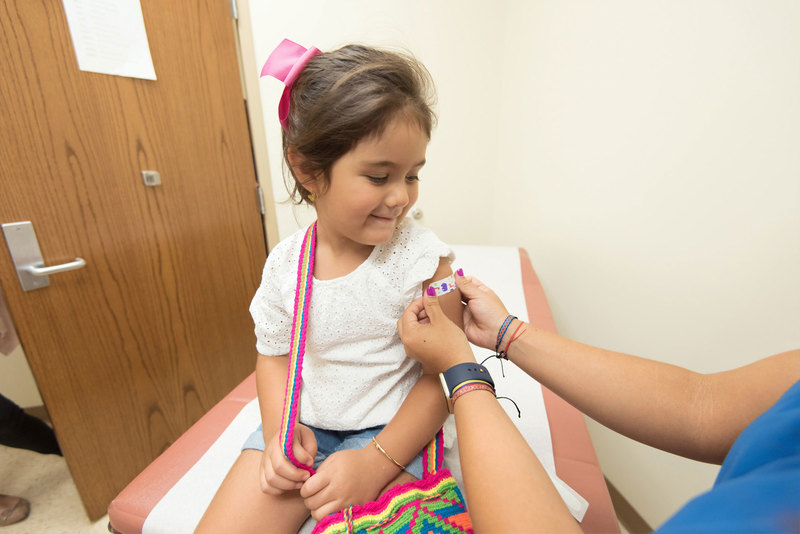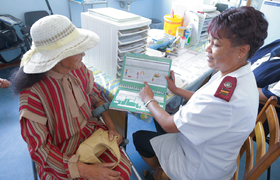Knowledge Translation Unit launches ‘long-awaited’ PACK programme for children
15 December 2023 | Story Niémah Davids. Photo Unsplash. Read time 5 min.
The Knowledge Translation Unit (KTU) has taken its Practical Approach to Care Kit (PACK) to a new level with the launch of PACK Child – a nifty guideline that’s guaranteed to bolster support for clinicians on the frontline who treat children at primary healthcare level.
Developed by the University of Cape Town’s (UCT) KTU, in partnership with the Western Cape Department of Health and Wellness, PACK Child is set to revolutionise the manner in which frontline healthcare workers assess, manage and treat children up to the age of 13. The guideline was officially launched in November 2023.
As with its adult counterpart, the tool combines the latest guidelines and policies across all clinical platforms into a single, practical implementation tool. With its roots in the Integrated Management of Childhood Illnesses (IMCI) programme, the tool features an expanded set of content, with a special focus on long-term health conditions like hayfever, asthma and eczema, as well as cardiac challenges and caring for children with special needs. It also provides guidance on caring for children over the age of five and highlights the importance of integrating routine well-childcare such as immunisations, growth monitoring and tuberculosis and HIV screening into every consultation.
KTU director, Professor Lara Fairall, said frontline clinicians are encouraged to use this comprehensive, integrated, clinical decision support tool during all consultations with children in primary healthcare. It provides a symptom-based approach to care and arranges information in a standardised format to help users navigate the guide easily. She said it uses the same format that primary healthcare providers have come to rely on for adult care.
The need to expand
Professor Fairall said the launch of the tool comes after multiple requests from clinicians on the frontline.
“There have long been many requests from frontline healthcare workers, as well as paediatricians working at hospital level for a child version of the Adult PACK.”
“There have long been many requests from frontline healthcare workers, as well as paediatricians working at hospital level for a child version of the Adult PACK, to ensure clinicians are better equipped to support and assist children in need of care,” Fairall said.
Further, she said, too often children with conditions that can easily be managed at primary healthcare level are referred to hospital-level because healthcare workers lack the support to manage their health conditions. This means patients are forced to endure extended waiting periods for appointments before they receive the care they need, and this places unnecessary pressure on the already overburdened healthcare system.
But Fairall said a comprehensive offering like PACK Child should go a long way with capacitating primary healthcare providers to manage children closer to home. It provides guidance on an expanded range of symptoms and helps healthcare workers identify and adequately manage long-term health conditions. Expanding PACK to cater to the full life course was critical to provide seamless, patient-centered care, she added.
Multi-year process
PACK Child has been in the making for the past eight years. The design and development process included a collaboration between various stakeholders such as the Provincial Pharmacy and Therapeutics Committee, the Nursing Directorate, and the Paediatric Clinical Governance Committee. Thereafter, the guide was piloted and evaluated in a small number of rural and metro health facilities in the Western Cape, and further reviewed and updated before its official launch.
“We are very pleased to have stayed the course and delivered PACK Child in response to sustained requests from clinicians and staff in the services, whose needs are foremost in our minds.”
Fairall said an e-book version of PACK Child is also available to ensure tech-savvy healthcare workers can access and easily navigate between pages on a mobile phone or laptop computer. Clinicians are also encouraged to attend the online introductory course for tips on how best to interact with the content the tool provides.
“This is a huge milestone in PACK’s journey. We are very pleased to have stayed the course and delivered PACK Child in response to sustained requests from clinicians and staff in the services, whose needs are foremost in our minds. We recognise that many healthcare workers continue to serve their communities under increasingly difficult circumstances, and hope that PACK Child goes some way to ensuring that they feel heard and supported,” Fairall said.
The KTU is currently focused on a large research project that involves piloting and refining a PACK Adolescent and Youth version.
 This work is licensed under a Creative Commons Attribution-NoDerivatives 4.0 International License.
This work is licensed under a Creative Commons Attribution-NoDerivatives 4.0 International License.
Please view the republishing articles page for more information.










